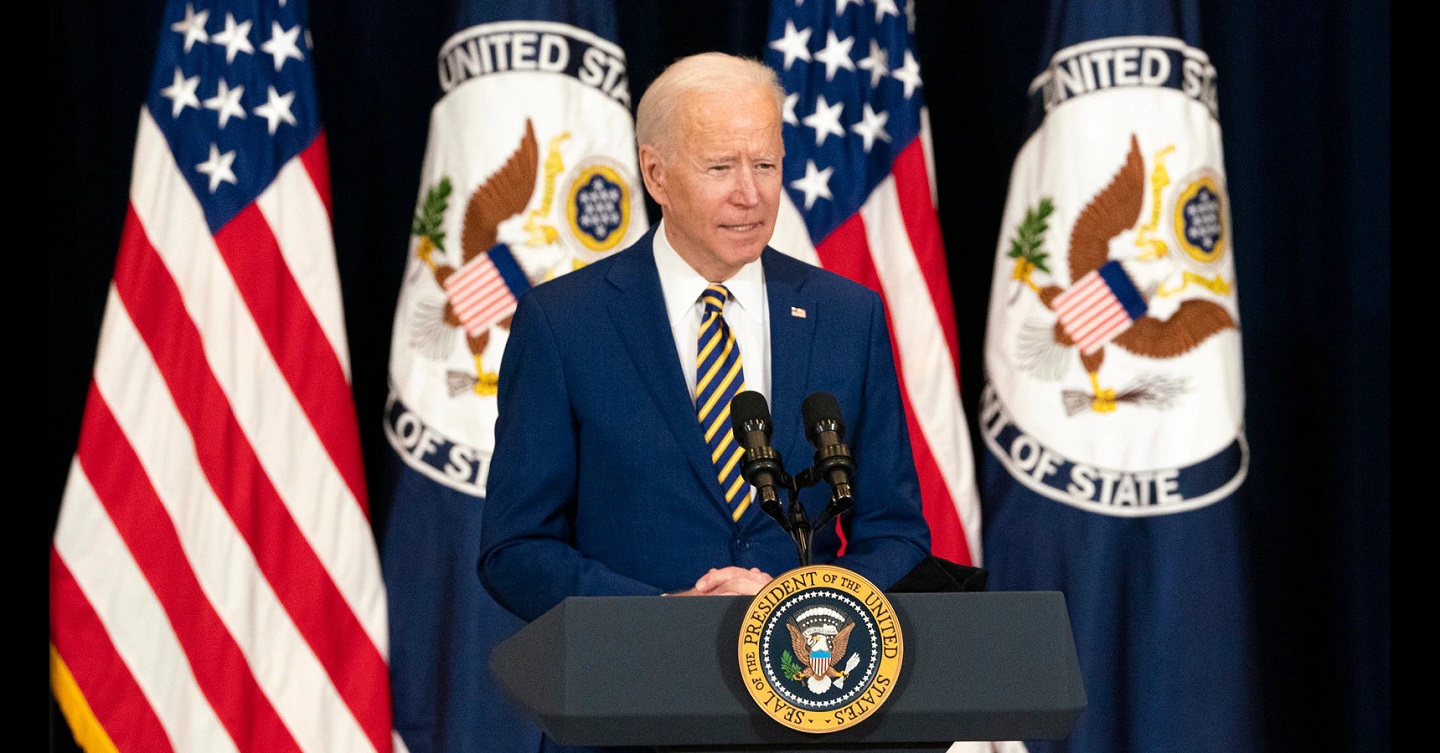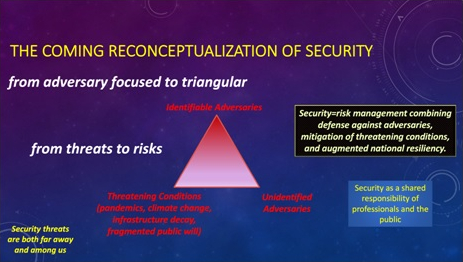
For this Whiteboard we reached out again to several scholars with the following prompt:
What should be the Biden administration’s top foreign policy priority?
Readers are invited to make their own contributions in the comments section.
DEMOCRACY AT HOME MUST BE AT THE FOREFRONT OF FOREIGN POLICY
1. Dr. Carrie A. Lee, Assistant Professor, Department of International Security Studies, U.S. Air War College and Incoming Chair, Department of National Security and Strategy, U.S. Army War College
Without a doubt, the major strategic challenge for the United States over the next century will be managing the rise of China and combating authoritarianism abroad. Indeed, the U.S. today is engaged in a long-term political competition that pits political liberalism against authoritarianism. But to preserve Americans’ security and interests abroad, the Biden administration must first shore up democratic foundations at home.
In a globalized world, the spread of authoritarianism threatens American liberties and security because it limits global free speech, transparency, and accountability. Interdependence leaves us vulnerable to new diseases, climate change, and economic instability; without transparency and accountability, countries are left unprepared and at risk. Yet China seeks to actively encourage autocrats and help them to consolidate power—and their increased influence presents a threat to U.S. interests and Americans’ safety.
The U.S. therefore needs democratic allies and partners around the globe who can and will resist Chinese influence and political coercion. But under the Trump administration, politico-economic instability, abuses of power, corruption, and the rise of white nationalism all made the U.S. an unreliable partner and even worse model for good governance. Trust in government in the United States hovers at record lows, and both foreign and domestic misinformation campaigns have deeply divided the country and undermined democratic institutions. The militarization of American politics—culminating with the armed insurrection at the Capitol building—has led many to conclude that the U.S. has little global standing to declare itself the leader of the free world.
The U.S. must therefore reclaim the narrative and offer a more compelling program that highlights the strengths of political liberalism. To do that, however, it must address its own democratic backsliding at home. This may take a variety of forms: expanding civil rights, increasing access to education, strengthening the rule of law, championing freedom of (and from) religion, countering disinformation, and restoring civilian control of the military, to name a few. Some have argued for a kind of “democracy summit”; regardless of the form it takes, without a strong foundation, the U.S. will not be able to rise to the challenge and compete in a new ideological competition. A China that is allowed to increase its influence through the spread of authoritarianism presents a clear and present threat to the U.S. way of life in a rapidly globalizing world. Yet the U.S. is not currently in a position to counter the threat with a global liberal agenda of its own because of its own tarnished political system. The Biden administration’s top foreign policy priority, therefore, should in fact be domestic in nature: rebuild democracy at home that it may serve as the model and foundation for a new liberal order.
THE RECONCEPTUALIZATION OF AMERICAN SECURITY
2. Dr. Steven Metz, Professor of National Security and Strategy, Department of National Security and Strategy, U.S. Army War College
Every president enters office with a list of foreign and defense policy priorities. Often, though, unexpected events interfere with their initial plan. George H.W. Bush, for instance, faced the rapid collapse of the Soviet Union; Bill Clinton had to forge a new post-Cold War strategy; and George W. Bush had to reconfigure U.S. strategy for counter-terrorism and homeland security. There are signs that Joe Biden too also faces a history-altering shift that ultimately supersedes his planned policy initiatives: a profound change in the way that Americans conceptualize strategy.
During the 20th century Americans thought of security mostly as defense against identifiable adversaries, normally the military forces of other states or insurgents attempting to take over a state. Security was delegated to long serving professionals or short term ones mobilized during a conflict. The September 11 attacks challenged this approach, compelling Americans to treat terrorism as a major threat. Homeland security became as or more important than expeditionary warfighting while the public became more involved in security, as least as sensors and front line intelligence collectors.
It now seems that the post-September 11 reconceptualization was simply the first phase of a broader change. Intensive and extensive global connectivity and transparency, the weaponization of everything, the ongoing privatization of security; and recognition of the security implications of threatening conditions like climate change, pandemics, and political factionalization are fueling the next shift.
This is the history-altering challenge that President Biden will face. In the broad sense the United States must expand its adversary-focused reconceptualization of security and strategy as a “triangular” approach. It must simultaneously address threats from identifiable adversaries, unidentified adversaries, and threatening non-adversarial conditions with security treated as a shared public responsibility rather than something exclusively or primarily delegated to professionals.

President Biden must choose how and how quickly to respond to this. It would be easy to resist change, clinging to the old, familiar adversary-focused approach. Ultimately, though, this would simply delay the inevitable, leaving management of the reconceptualization–and the reorganization it will require–to a future president. It would be safer to begin laying the intellectual foundation for the inevitable reconceptualization now. The President and his administration should shift the way they talk about security, gradually introducing the triangular notion. The Biden administration should also create organizations and study groups to examine the process of adapting to a triangular conceptualization of strategy, including major organizational redesign.
No matter whether the Biden administration does this or not, the fundamental character of security will change. Better to deliberately manage the process now than later reacting in a panic.
THE ONLY THING WORSE THAN ALLIES
3. Dr. John Nagl is a retired Army officer and a senior fellow at the Foreign Policy Research Institute.
In his classic 1948 work Politics Among Nations, Hans Morgenthau listed nine elements of national power: geography, natural resources, industrial capacity, military preparedness, population, national character, national morale, quality of diplomacy, and quality of government. Of these, the most important are quality of government and quality of diplomacy.
These attributes make potential power real, allowing the United States to enhance the security and prosperity of the American people and hundreds of millions of others around the world. While 2021 is far distant, chronologically and otherwise, from 1948, the importance of good government and good diplomacy remain constant. America’s most important strategic advantage, and the one whose maintenance should be the first foreign policy priority of the Biden Administration, is our system of alliances.
Allies can be a bother, of course— Churchill is reputed to have said “There is only one thing worse than fighting with allies, and that is fighting without them.” We have discovered the truth of this aphorism over the past four years as America has largely been fighting without, and sometimes even against, our traditional allies. An “America First” foreign policy has in fact all too often meant America alone, devaluing the force multiplier that is our greatest single foreign policy advantage and point of leverage.
Whatever tool of national power is required—diplomacy, information, military, or economics (and now increasingly cyber and space), the effect of American power is multiplied many fold when it is used in conjunction with our friends and allies around the globe. This is particularly true in the complex “wicked” problems that we so often confront in today’s multipolar world.
The Biden Administration confronts many challenges, and among them is a global image of the United States in sharp decline. A September 2020 Pew Research poll found that among 13 key allies, perceptions of the United States are at record low levels. The US response to COVID-19 has been a driving force in these perceptions, as has been the relative unpopularity of former President Donald Trump. These perceptions matter, as many of the most pressing international issues, such as pandemic response, economic recovery, and climate change, will benefit from collective and coordinated international action.
Approaching the Biden Administration’s foreign policy from the perspective of restoring and renewing American alliances is particularly helpful because so many of the actions required to accomplish that objective are objectively good in their own right—and restoring America’s alliances in turn makes the accomplishment of those objectives more likely. For instance, restoring our key relationships in Europe of necessity required rejoining the Paris Climate Change Accords and the World Health Organization—enabling multinational action on climate change and the pandemic, two problems which America Alone could not begin to solve.
It will take hard work to restore trust in America as an ally; the experience of Syrian rebels abandoned to their fate after a hasty American withdrawal announced by Twitter surely still is a mark of shame even after the resignation of Secretary of Defense James Mattis in protest. But much of the work required is not particularly difficult. If the Biden Administration appoints competent public servants to lead our foreign policy apparatus, consults regularly with our friends around the globe, and works together with them to confront our shared challenges, we can again become a shining city upon a hill. We will only be made stronger by the presence of many other allies and friends who share our values and our interests, and with whose help America has created a virtuous circle of relative peace and prosperity in the wake of the Second World War that has transcended political parties and partisanship. It is our greatest foreign policy treasure, and we should spare no effort to restore its luster.
The views expressed in this Whiteboard Exercise are those of the contributors and do not necessarily reflect those of the U.S. Air War College, U.S. Air Force, U.S. Army War College, U.S. Army, or Department of Defense.
Photo Description: President Joseph R. Biden, Jr., with Vice President Kamala K. Harris and Secretary of State Antony J. Blinken, delivers remarks to State Department employees, at the U.S. Department of State in Washington, D.C., on February 4, 2021.
Photo Credit: State Department Photo by Freddie Everett/ Public Domain
Other releases in the “Whiteboard” series:
- AFTER 2020, WHAT’S NEXT? (A WHITEBOARD)
- IMAGINING OVERMATCH: CRITICAL DOMAINS IN THE NEXT WAR (A WHITEBOARD)
- THAT ONE MOST IMPORTANT THING: (A WHITEBOARD)
- SHALL WE PLAY A GAME?
(WARGAMING ROOM) - WAR(GAMING) WHAT IS IT GOOD FOR? (A WHITEBOARD)
- LEADERSHIP ROLE MODELS IN FICTION REVISITED: (A WHITEBOARD)
- WHAT GOOD IS GRAND STRATEGY? (A WHITEBOARD)
- THE UNITED NATIONS’ GREATEST ACCOMPLISHMENT: (A WHITEBOARD)
- LEADERSHIP ROLE MODELS IN FICTION: (A WHITEBOARD)
- THE MOST IMPORTANT LEGACY OF THE VIETNAM CONFLICT: (A WHITEBOARD)





Many of us have been watching Communist China for decades, so this sudden notice of it being a threat to the United States and the world is long overdue. Even the Pew Report, with its dubious statistics, uses a photograph of the Capitol for its report shows how far things have come.
The British and European press has been very one-sided for years, as has NPR, and using them as sources repeats the errors. The United States called out our fair-weather allies after years of not living up to agreements and for their willingness to overlook Russian and Chinese influence in their countries – making nice, ignoring their violations of law (as in the S. China Sea and the Ukraine) and needing their money is similar to their past history of appeasement, and we know what happened then.
It seems that going back to an earlier, recent time (where we paid off governments and regimes to do our will) is where we’re headed.
When will we learn?
The Biden administration’s top foreign policy priority should be in determining how best to deal with and reverse:
a. America’s loss of “soft power” in the 21st Century. And in determining how best to deal with and reverse:
b. The gains in “soft power” that our opponents have achieved in the 21st Century.
Explanation:
The fact that U.S./Western “soft power” is on the wane today; this appears to be because it demands too much of — and thus tends to stand against — such things as traditional society.
The fact that Russian (et. al) “soft power” is on the rise today; this appears to be because it, in sharp contrast, supports traditional society and, thus, stands against new/modern U.S./Western society and its radically modern demands.
This, quite obviously, is a reversal of the roles and strategies of the U.S./the West versus the Soviets/the communists in the Old Cold War — for example — as the following March 21st, 2018, The American Interest article entitled “The Reality of Russian Soft Power,” by John Lloyd and Daria Litinova, appears to recognize:
“Liberal democratic societies have, in the past few decades, undergone a series of revolutionary changes in their social and political life, which are not to the taste of all their citizens. For many of those, who might be called social conservatives, Russia has become a more agreeable society, at least in principle, than those they live in. Communist Westerners used to speak of the Soviet Union as the pioneer society of a brighter future for all. Now, the rightwing nationalists of Europe and North America admire Russia and its leader for cleaving to the past.”
Bottom Line Thought — Based on the Above:
In the Old Cold War of yesterday, when it was the Soviets/the communists who sought to advance radical/revolutionary/modern political, economic, social and value “change” throughout the world, it was the U.S./the West, back then, that successfully “contained” same — this, by embracing and promoting such things as political, social, value, etc., conservatism.
In the New/Reverse Cold War of today, however, the reverse of this has become true.
Thus, unless the Biden administration can get a handle on this such phenomenon — and find a way to reverse these such “soft power” trends — then:
a. The fate of “radical” America in the 21st century, this may become:
b. The exact same fate as that of the “radical” Soviet Union in the 20th century?
These are all excellent observations and recommendations. To Dr. John Nagl’s point on diplomacy I would add that our diplomacy is somewhat constrained by a “history deficit” in our educational system as a whole. For example, Putin’s Russia represents a complex challenge to the US that we tend to see through a narrow prism, forgetting the fact that his government supports the Holy Land/Jerusalem, and Bethlehem among other areas and that support resonates with people for example that are Eastern Orthodox, in the Balkans, the US, East Africa, the Baltics, and the Levant region of the Middle East-complexity is required in our approach and we should explore a more nuanced (short of a Yalta II) approach as it has been historically west leaning. I also believe that the privatization of aspects of our national security has been expanded by default to a broader universe of players, including the global capital markets and Corporate America, Corporate Europe, and Corporate Asia as they have taken the mantle on addressing climate change through ESG/Sustainable investing and Proxy Voting/Stewardship to better ensure that investee companies are discharging their responsibilities to enhance sustainable growth, which can lessen the burden on our military by mitigating the potential for climate conflict emanating from climate change, the risk of climate refugees being trafficked (modern slavery generates about $150 billion/year in profit, which is invested in countries thus exacerbating corruption-in fact the UK has elevated illicit finance/AML as a foreign policy priority), wildlife trafficking supporting for example, terrorist groups in Africa, etc. A pillar of US foreign policy should be to build upon a more multipolar Bretton Woods System (which China still benefits from) with the private sector helping to anchor it further (The UNPRI has approximately 3000 signatories representing over $100 trillion in AUM). Initiatives such as the The Blue Dot Network, the BUILD Act and the Three Seas Initiative should be further explored with more private sector support, as many of our traditional allies (Member of the Paris Club are in debt to varying degrees to China) are limited in their latitude to commit public sector funds. As for China’s ascendant financial status, contractual dispute resolution often occurs in jurisdictions outside of China, (e.g., Singapore) and Russia-that speaks for itself. Applying a more positive Financial Statecraft with a more nuanced approach to sanctions to stave off diversification from the dollar (China’s CBDC is hastening this change) should also be considered. A 21st Century Global Policy of Selective and Judicious Containment paying homage to the best of George Kennan’s strategy might be just what we need.